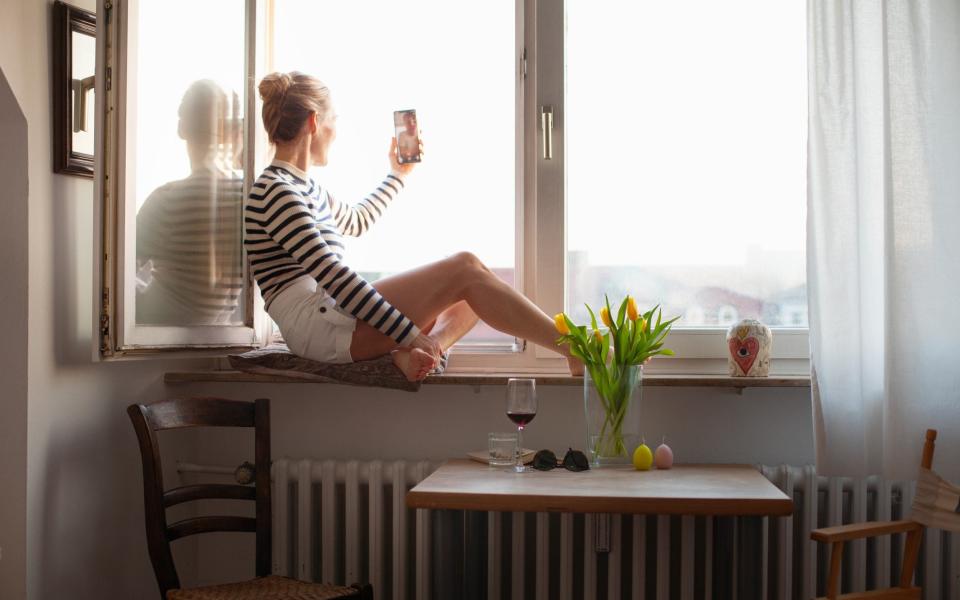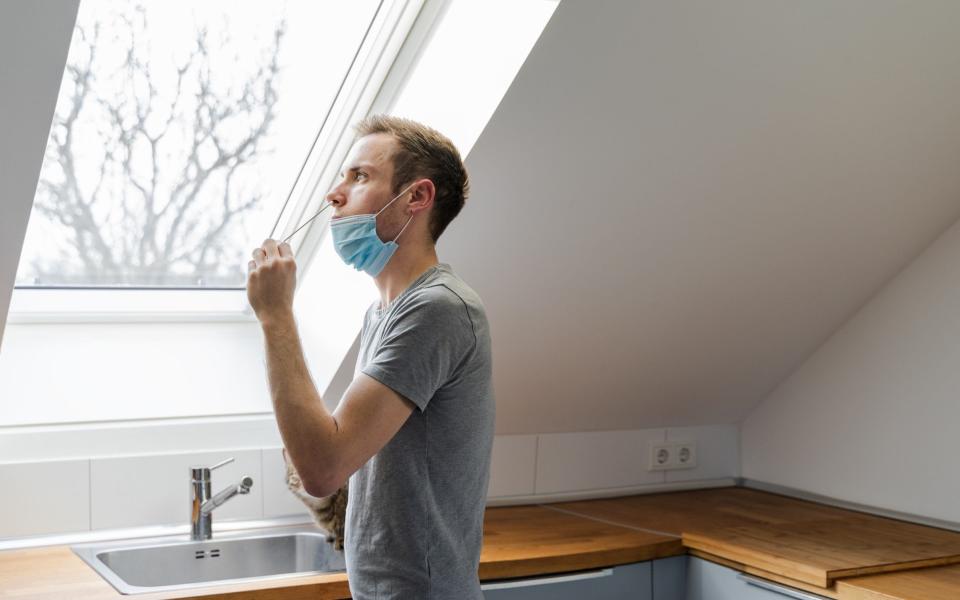What to expect when you quarantine at home after a holiday

Saturday morning door knocks, daily, monotonous phone calls and testing rigmarole are just some of what you’ll experience when returning from an amber destination if you're not fully vaccinated.
The amber list is the biggest traffic light category and includes most major European countries. Some 23,465 passengers travelled into the UK from amber-listed destinations between May 20 and June 9 (although only 89 were found to test positive for coronavirus).
Unvaccinated travellers entering the UK from these destinations are, as in the case for all arrivals, required to present evidence of a negative Covid-19 test result before departure. They must then enter up to ten days of self-isolation at home. Quarantined returnees must also book, pay for and take PCR tests on day two and day eight (with their arrival day being day zero). They can also opt to pay for an additional PCR test on day five for the chance to cut short their self-isolation.
The Government warned travellers that there would be stringent checks to make sure people were adhering to self-isolation rules. Indeed, for most of those whom Telegraph Travel has spoken to, that appears to be the case. Travellers who’ve arrived back from an amber destination in recent weeks offer an insight into what you should know before quarantining at home.
Arrivals may be smoother than you expect
Among the travellers we spoke to, none had encountered a long delay at passport control.
Sharmine Sokataly, who is originally from France, but now lives in London, returned to the UK from her home country on June 12, via Eurostar.
“I did not notice any significant delays in passport control, though they now ask more questions both about exiting France and entering the UK (proof of address, reason for travel, whether I had been vaccinated). The questions seemed to be a mix of Covid restrictions and Brexit changes.”
Anthony Peters, who returned from Antigua to his home in Oxfordshire on Friday morning, says he found the process coming into Gatwick to be flawless: “[You just have to] fill in all the forms and can come through Gatwick with relative ease.
“Pre-flight track and trace is immaculately organised.”
For Ian Spurr, who arrived back from Portugal on June 13, the process wasn’t quite as seamless.
“We arrived into Manchester at 11.39pm, which was 30 minutes earlier than scheduled, so we have had to complete a new passenger locator form as the day you land dictates your isolation schedule. The queues into passport control were lengthy as the digital passport readers were closed. We waited in a queue for about 25 minutes before we were called through to have our documents checked.”
Prepare for testing fatigue – and perhaps late results
For Sharmine, the most hassle came from the testing process. She says: “I had received my test kits on time, however not the results so far.
“The second day results weren't arriving, so I got a bit anxious and called 119. They were very useful and kind, and sent me an NHS testing kit.
“I did receive my results from my private provider in the end, but later than expected (day 6).
“It doesn't help that my provider's email address and phone number don't work.”
Anthony Peters found the testing costs particularly galling. “We’ve paid the best part of £600 each for all the tests”, he says.
Expect daily calls to check your whereabouts
“I’ve been contacted every day. One day someone turned up at the door,” says Maria Bataller, who returned from Spain on June 10.
Helen Clarke, a PR consultant from Essex, and who returned from Mexico on June 14, has had a similar experience. “They’ve called me about three times to ensure I am at home. They haven’t called me in two days now and I am on day eight (I took my day eight test today).”
“It’s quite monotonous and a bit of a chore to be honest”, says Helen.
The caller typically asked for confirmation of the name and date of birth of the person they were calling and to confirm that the person in question is isolating at the address they gave on the locator form.
Helen adds: “The first person who rang me rang on my second day also wanted me to confirm that I had done or was due to do my day 2 test.
“The other calls didn’t mention the tests just to confirm that I was still at home and hadn’t been out”.
Olivia Neukamm, who works for Irvine Partners, recently returned from Switzerland, where she was visited her boyfriend. She was contacted around mid-morning each day of her quarantine. “They were reading from a script, and by the end of isolation I'd heard it so many times I could respond to the next question before they asked it!”, she says.
Anthony, by contrast, has yet to receive a call.
Sharmine says: “I've only been able to answer two calls due to being very busy with work meetings or my phone being on silent. They usually happened between 12pm and 2pm.”
However, Maria said her check-ups would sometimes come in the morning, sometimes around lunchtime, sometimes later in the afternoon.
You may receive an early morning visit
One couple in particular felt the check-ups went too far. Ian Spurr and his wife Tracey are both nurses with managerial roles in the NHS. Portugal was on the green list when they booked their holiday. They had originally planned to travel to Cyprus with Tui but switched to Portugal when Grant Shapps, the Transport Secretary, first confirmed it would be green-lit on May 17. “We landed in Portugal on June 3 and within four hours the announcement was made that Portugal was moving to amber,” says Ian.
“We arrived back on June 13, we were both called on the 15th by phone, and someone turned up at the door as well.
“He asked for ID which in hindsight I wish I'd not provided as I feel that I shouldn't have to provide that in my own house.”
The experience Ian found most galling during self-isolation came a couple of days later.
“On Saturday a woman turned up at our house and woke us at 8.30am by keeping her finger on the doorbell. As you can imagine I did not find this acceptable and became quite irate. As we both work, Saturday and Sunday affords us a few hours extra sleep. When someone rang me later that morning I was still angry (not abusive) and she put the phone down on me. We both feel that the checking up is almost harassment.”
Trips to the post box are permitted
The tests amber list travellers must take during their quarantine period are typically either delivered to their address, self-administered at home and returned in the post; taken at a clinic or private testing centre; or (usually the more expensive option) taken at home then dispatched to the testing provider by a courier.
It is permitted for amber travellers to leave their home to post a test. However, as Anthony says, this does seem to go against the point of self-isolation “[It does seem] a little bit bizarre that [I’m] in quarantine but allowed to go to the post office to post the test. There are lots of incongruities.”
Most forgo the ‘Test to Release’
Among those Telegraph Travel spoke to, only Anthony had opted to pay for an extra test on day five to potentially cut short his quarantine period.

You might consider putting up with it again
Most who’ve experienced post-travel self-isolation want to avoid a repeat if it's just for a brief trip. Helen says: “I would [do it again] but only go if I was travelling for longer than two weeks. Having to do the tests and quarantine after just a week’s holiday or less just doesn’t seem worth it for me, unless you’re dying to get abroad or have to go for an emergency. But yes, if I go away for a long trip I would be happy to do it all again.”
Meanwhile, Sharmine says: “It really depends, I am considering going on holiday to an amber country, but I'll only do it if I don't have any important plans back in the UK.
“I might even consider staying abroad for longer to avoid having to go back and forth from the UK and quarantining every single time”.
A Government spokesperson said:
“We are determined to protect the vaccine rollout and will not compromise on the progress we have made.
“Addresses on passenger locator forms are verified by the Public Health England test and trace service and Mitie are now conducting 10,000 compliance checks a day to check whether people are isolating at home after returning from abroad.”
Further information from the Home Office:
The Home Office has worked closely with Mitie in the development of this programme, including training staff on engaging those who are undergoing checks and designing the scripts used by them
The Isolation Assurance and Compliance service calls people who are arriving in the UK and responds to non-compliance reported by the IAC service
Police have issued 666 Fixed Penalty Notices in England for violations of travel rules

